Collagen is the most abundant protein in the body, forming a flexible matrix found in skin, bones, and connective tissues. (1) However, the body’s natural collagen production tends to decline with age. (2) For this reason, collagen peptides are a popular dietary supplement for people interested in anti-aging, skin health, joint health, or overall wellness.
One popular and inexpensive choice is Sports Research Collagen Peptides. This product contains bovine collagen to support your body’s natural collagen stores, and it’s third-party tested to ensure quality. In this Sports Research Collagen Peptides review, we’ll walk through the major benefits of collagen powder supplements, how this best-seller stands out, and who it’s a good fit for.
| Medical disclaimer: This article is intended for educational and informational purposes only. It is not intended as a substitute for medical advice. For health advice, contact a licensed healthcare provider. |
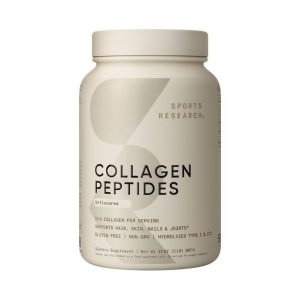

Key product features
What you should know
Sports Research Collagen Peptides provides 11 grams of collagen peptides per serving, with minimal other ingredients. Here are the most important things to know about it:
- This product is third-party tested by Informed Choice, so you can trust that the container’s contents match the label and are free of potentially harmful contaminants.
- Sports Research Collagen Peptides cost about $0.90-$1.50 per serving, depending on the container size, less than many similar collagen peptide products.
- Collagen peptide supplements are a good choice for people who want to support their skin and joint health. (3, 4)
Sports Research Collagen Peptides overview
Supplementing with collagen may support skin hydration, muscle and joint recovery post-exercise, body composition, and sleep quality. (3,4,5) Before purchasing Sports Research Collagen Peptides, here are several key facts to consider:
Sports Research Collagen Peptides ingredients
The primary ingredient in this product is hydrolyzed bovine collagen peptides derived from cowhide. The term “hydrolyzed” describes collagen that has been broken down into smaller units known as peptides. This may make the collagen easier for your body to absorb and use. (6)
Flavor variants and composition
- Unflavored: Contains purely hydrolyzed collagen peptides without any additional ingredients.
- Dark chocolate: Includes hydrolyzed collagen peptides, cocoa powder, natural flavors, sea salt, and sweeteners such as stevia leaf and monk fruit extracts.
- Vanilla: Composed of hydrolyzed collagen peptides, natural flavor, and monk fruit extract as a sweetener.
Each flavor provides 11 grams of collagen per serving, featuring a blend of type I and type III collagen. These are the most common types of collagen in your body, and both decline with age. Although there are over 20 types of collagen with unique structural roles, including these two offers the broadest spectrum of benefits for skin health, joint health, and overall wellness. (7)
Type I collagen is the most common type, found in skin, bone, blood vessels, tendons, and other tissues. (8) Type III collagen is significant for skin health and assists in the body’s management of type I collagen, potentially impacting the visible signs of aging and overall tissue health. (9) It also appears to play an important role in regulating the body’s production and distribution of type I collagen. (10) This combination may not only supplement the body’s collagen levels, but also support its natural collagen production and maintenance processes.
Sports Research Collagen Peptides nutrition
Each flavor provides 40-50 calories per serving and 10-11 grams of protein. The dark chocolate flavor also contains half a gram of fat and two grams of dietary fiber from the cocoa powder.
The collagen protein in this supplement is composed of 18 different amino acids, including glycine, proline, and hydroxyproline.
Glycine is a nonessential amino acid, which means the body can produce it and you don’t need to get it through your diet. However, some researchers argue that glycine should be considered an essential micronutrient due to its powerful benefits. Glycine is anti-inflammatory and plays roles in collagen synthesis, wound healing, muscle growth, and tissue generation. (11)
Proline and hydroxyproline are nonessential amino acids and major components of collagen. They’re necessary for protein synthesis, which is key to skin and joint health benefits of collagen peptide supplements. (12, 13)
However, collagen peptides do not qualify as a complete protein because they don’t contain all nine essential amino acids—those which your body cannot produce on its own and must obtain through your diet. You shouldn’t depend on collagen peptides as a primary protein source for this reason, although they may be safely used for roughly one-third of your daily protein needs. (14) For a more complete protein, consider one of these protein powders reviewed by dietitians.
Sports Research Collagen Peptides side effects
The use of collagen is safe and side-effect-free for most people. However, it may cause minor digestive side effects, like nausea, gas, or heartburn in some. (15)
If you experience side effects from taking collagen peptides, try splitting a serving into multiple smaller servings throughout the day. If symptoms persist, you may need to stop taking the supplement and make an appointment with your healthcare provider.
Sports Research Collagen Peptides testing and certifications
Sports Research Collagen Peptides are tested and certified by Informed Choice. This third-party organization ensures that products are free of contaminants and contain only the ingredients disclosed on the label (in the correct amounts).
Additionally, this product is verified non-GMO through Nutrasource’s International Genetically Modified Organism Evaluation and Notification (IGEN) Program and certified gluten-free by NSF.
Specs
| Rating | 4.4 |
| Cost per serving | $0.90-$1.50 |
| Collagen source | Bovine |
| Collagen per serving | 11 grams |
| Collagen types | I, III |
| Protein per serving | 10-11 grams |
| Calories per serving | 40-50 |
How to use Sports Research Collagen Peptides
To use these collagen peptides, just mix one scoop (or one packet) into your beverage of choice.
The powder dissolves better in hot liquids and may clump in cold liquids. For this reason, Sports Research recommends mixing the peptides into room temperature liquid and then adding ice after to make your drink cold. These collagen peptides can also be blended into smoothies or protein shakes.
Buying Sports Research Collagen Peptides
Sports Research Collagen Peptides can be purchased through Amazon or the Sports Research website. Prices vary between these sites, as well as the various flavors and container sizes that are available.
Although buying through Amazon often means faster shipping, ordering through Sports Research allows you to utilize their satisfaction guarantee. This policy allows you to request a refund or a replacement if you’re unhappy with the product for any reason.
What customers are saying
On Amazon, Sports Research Collagen Peptides have an average rating of 4.6 out of five stars from over 129,000 customer reviews. For the most part, reviewers are very happy with this supplement. In positive reviews, customers note that it’s easy to mix into their smoothies or morning coffee, and that after weeks or months of consistent use it does seem to improve their skin’s appearance and their achy joints.
“For cost, convenience, flavor, and effectiveness, this is the best collagen product I’ve tried overall.”
Rocky S., Amazon
However, some reviewers disagree. Although negative reviews for this product are much rarer, many negative reviewers say that even the unflavored variety has a distinct aftertaste. Some reviewers also note that it’s clumpy.
“It didn’t dissolve well, little clumps,” says Amazon reviewer Connie B., adding, “The taste was so bad I could hardly drink it.” However, Sports Research notes on its website that the peptides won’t mix well in cold beverages.
We’ve featured Sports Research Collagen Peptides in:
- The best collagen powder supplements, according to experts
- The best clean protein powders, reviewed by a dietitian
- The best matcha powders, reviewed by a registered dietitian
Who Sports Research Collagen Peptides is recommended for:
- Athletes: Athletes may benefit from taking collagen peptides to help strengthen and support their joints, ligaments, tendons, and other connective tissues. Collagen supplementation may also assist with workout recovery by supporting more rapid collagen turnover to keep connective tissues strong and functioning well. (16)
- People with skin concerns: Individuals with wrinkles (or those who want to prevent them) and those with sagging or loose skin may benefit from collagen supplementation to plump up the skin. (3, 15)
- People with joint problems: Those dealing with joint pain or injuries may also benefit from collagen supplementation. Collagen may help reduce pain, improve strength, and speed up exercise recovery—especially when paired with resistance training. (4,16) Here are more joint supplements that may be helpful.
Who Sports Research Collagen Peptides is not recommended for:
- Vegans and vegetarians: Most collagen peptides are animal-sourced (either bovine or marine, typically), so they’re not appropriate for vegans or strict vegetarians. These vegan protein powders may be suitable protein alternatives for plant-based eaters.
- Organic or grass-fed eaters: Sports Research Collagen Peptides won’t be the right fit for you if you prefer organic foods and supplements or grass-fed beef products. However, Sports Research also offers an Organic Collagen Peptides product, made with grass-fed bovine collagen.
Sports Research Collagen Peptides vs Vital Proteins
Vital Proteins is a well-known collagen peptides company and a major competitor to Sports Research. Both offer collagen peptides in multiple flavors (Sports Research in dark chocolate, vanilla, and unflavored; and Vital Proteins in unflavored, lemon, chocolate, matcha, salted caramel, strawberry lemon, and vanilla). For this comparison, we will focus on the unflavored varieties.
Formula and serving size: Both products consist solely of collagen peptides and blend type I and III collagen. Vital Proteins offers its peptides in a larger portion, four tablespoons per serving, which delivers 18 grams of protein and 20 grams of bovine collagen. Notably, Vital Proteins sources its collagen from grass-fed cows.
Cost: Vital Proteins is typically more costly, at about $1.43 per serving, compared to Sports Research’s more economical $0.90 per serving for a 16-ounce container (both prices sourced from Amazon). However, Vital Proteins’s larger serving size means it costs slightly less per gram of collagen, making it a potentially better value if you prefer grass-fed collagen and larger servings.
Compare Sports Research Collagen Peptides
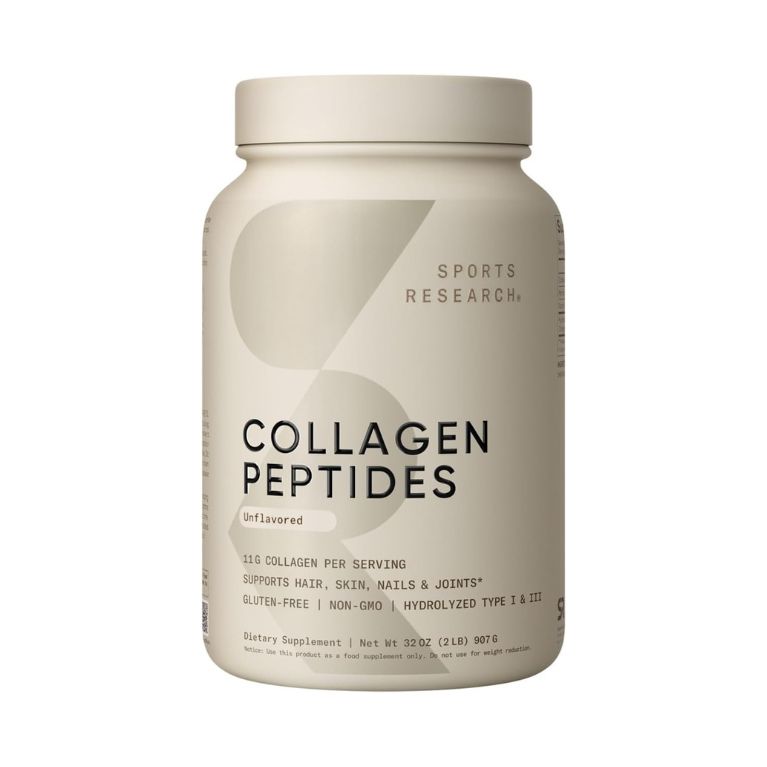
|
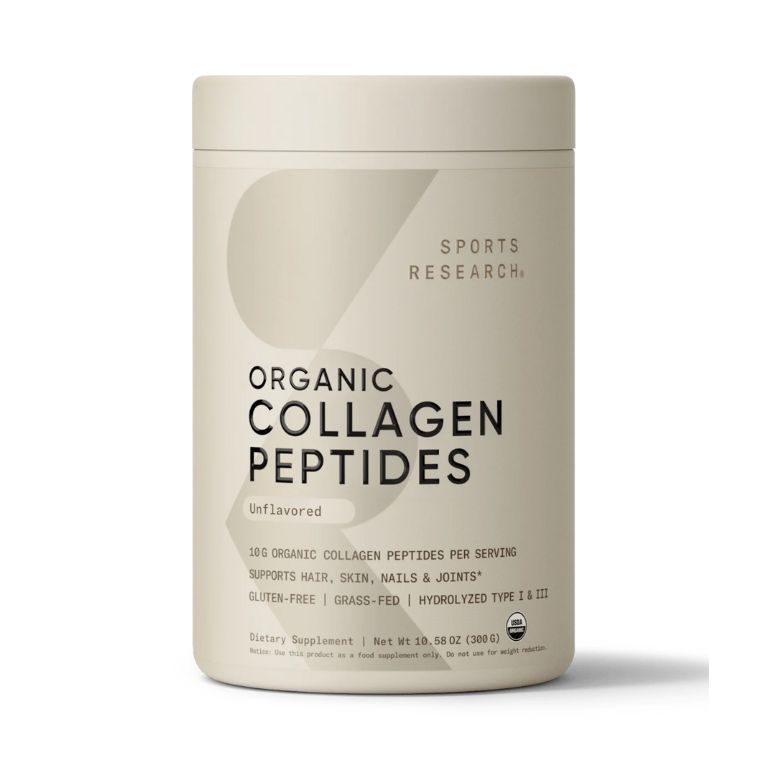
|
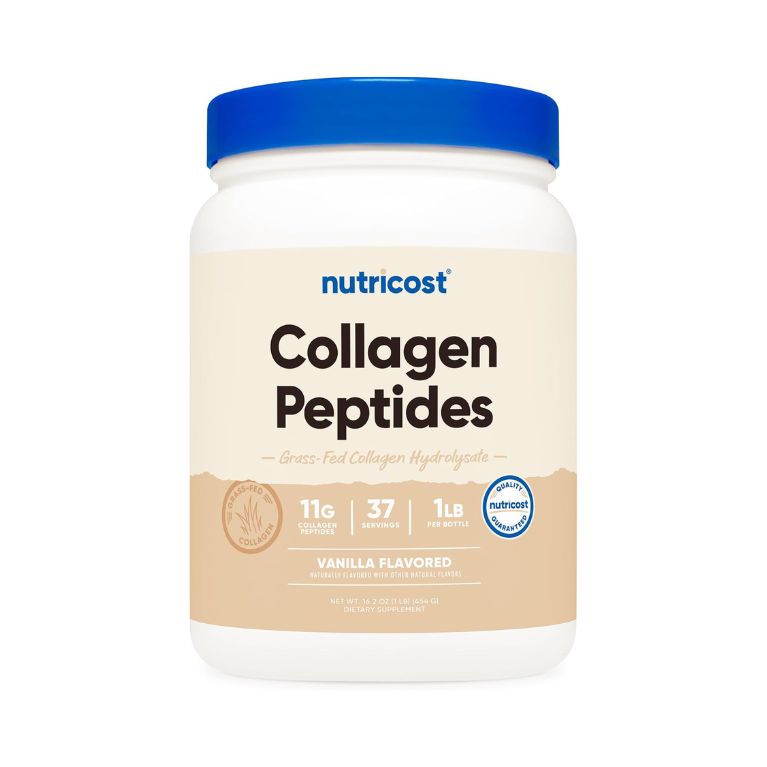
|
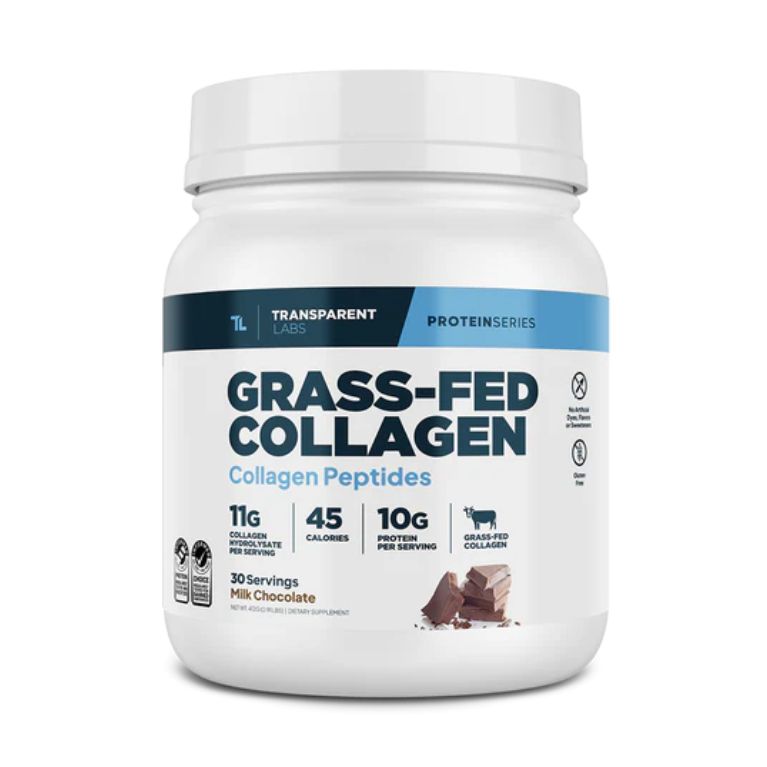
|
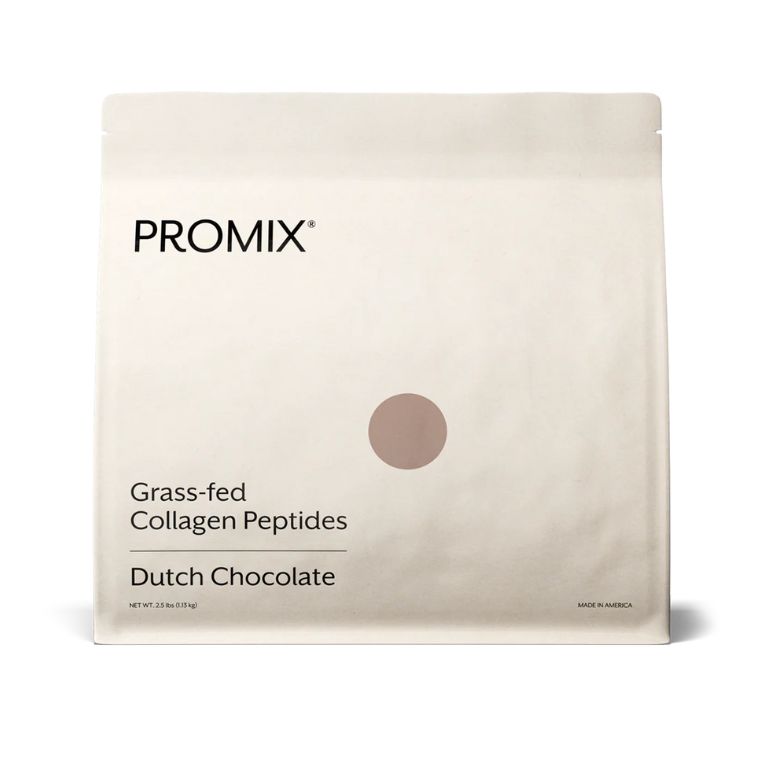
|
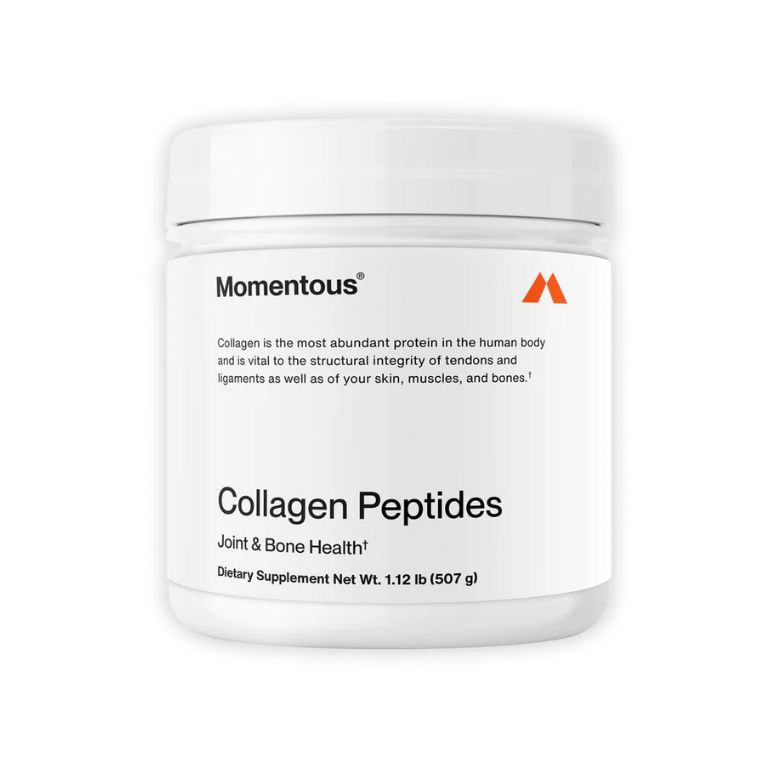
|
|
| Sports Research Collagen Peptides | Sports Research Organic Collagen Peptides | Nutricost Collagen Peptides | Transparent Labs Grass Fed Collagen | Promix Collagen Peptides | Momentous Collagen | |
| Rating | ||||||
| Cost per serving | $0.90-$1.50 | $1.10 | $0.83 | $1.17 | $1.31 | $1.73 |
| Type of collagen | Bovine | Grass-fed bovine | Grass-fed bovine | Grass-fed bovine | Grass-fed bovine | Grass-fed bovine |
| Collagen per serving | 11 grams | 10 grams | 11 grams | 11 grams | 22 grams | 11.6 grams |
How we test collagen supplements
We’re dedicated to offering recommendations we genuinely believe will improve your daily life. This means meticulously analyzing each collagen powder from multiple angles to ensure we provide you with trustworthy and realistic suggestions.From ingredient quality, safety, taste, and more, here’s how we applied these methods to this piece.
Learn more about our collagen scoring methodology.
Collagen type—35%
There are three main types of collagen (I, II, and III), each offering different health benefits and being present in different parts of the body. Type I is the most abundant and is crucial for skin, bones, and tendons. Type II is primarily found in cartilage, and Type III is important for skin and blood vessels. Collagen supplements that include all three types are valued more highly because they provide a broader range of benefits, supporting overall skin health, joint function, and connective tissue strength.
Collagen source—30%
The source of collagen is important because different animal sources can vary in their effectiveness for specific health benefits. Marine and porcine collagens are particularly noted for their efficacy in improving skin elasticity and reducing joint pain, which are common reasons for taking collagen supplements. Products that use these sources or a blend that includes them are rated higher because they are more likely to deliver the desired benefits effectively.
Here are a few we consider:
- BovinePorcine
- Ovine
- Marine
- Blend
Hydrolyzed—20%
Hydrolyzed collagen is rated higher because it has been broken down into smaller protein chains, known as collagen peptides, which are easier for the body to absorb and use.
Sweeteners—10%
The type and amount of sweeteners used in collagen can impact taste, caloric content, and health effects. We consider the sweeteners to ensure that the product meets preferences for taste while aligning with dietary needs.
Here are the ones we consider:
- Sugar
- Dextrose
- Honey
- Agave
- Stevia
- Maltodextrin
- Erythritol
- Monk fruit
- Sucralose
- Aspartame
- Xylitol
- Acesulfame
Price per serving—15%
We consider the cost per serving to assess whether the product offers good value for money while delivering an effective dose of collagen.
Our factors in this rating include:
- $.30-.$.99 per serving
- $1.00-.$1.49 per serving
- $1.50-.$1.99 per serving
- $2.00+ per serving
FAQs
Can I take collagen every day?
Yes, you can take collagen every day. It may take weeks or months of consistent collagen use before you experience noticeable changes, so taking it daily is important. Most research studies that show positive benefits of collagen supplementation have a study period of at least six weeks of daily use. (17)
What time should I take collagen?
You can take collagen at the time of day that’s most convenient for you. Many people prefer to take collagen in the morning, but some may take it before bed at night. One small study shows that collagen may help improve sleep quality when taken one hour before bedtime, though more research is needed. (5)
Is Sports Research Collagen Peptides organic?
No, Sports Research Collagen Peptides aren’t made with organic ingredients. However, all of the flavors are non-GMO. Additionally, the formulations are simple and free of artificial sweeteners, dyes, and preservatives. Sports Research does offer an organic version of the product, though.
These statements have not been evaluated by the Food and Drug Administration. These products are not intended to diagnose, treat, cure, or prevent any diseases.
Our experts
Pete Nastasi, NASM
Pete owns N2 Nutrition and Performance, where he leverages his expertise as a certified sports nutrition coach and personal trainer to help individuals achieve their sports performance and weight loss goals. Passionate about helping people reach their peak potential, Pete tailors his approach to each client, focusing on diet optimization, fostering healthy habits, and designing easy-to-follow workout routines. Pete also keeps up-to-date with the latest fitness and supplement trends, using his degree in biochemistry to rigorously vet supplements and explain how they work to his readers.
Joana Neziri, M.S., NASM CPT
Joana is a writer, editor, and content strategist focusing on nutrition, fitness, and all things health. After earning a master’s degree in business from the University of North Florida, she began a career in research and digital marketing.
Jessica Coulon
Jessica is a contributing editor and writer who specializes in fitness, health, nutrition, and science content. Previously, she was an editor for Popular Mechanics and Bicycling, where she covered pro cycling news, wrote how-to guides, and tested all the latest and greatest bike gear. She was also a regular shoe tester and contributor for Runner’s World. You can often find her skiing or riding her mountain bike, and racing with the F1RE female enduro team.
Kelly Uhler
Kelly has a multifaceted background in elder care, health care, and copywriting. She has worked for organizations such as A Place For Mom and Homecare.com, which gave her the opportunity to work closely with families, providing reliable information to help them make informed decisions about their loved one’s health, safety, and quality of life.

SaVanna Shoemaker, RDN
Fortune Recommends Writer
About Author
SaVanna is a freelance writer and Registered Dietitian Nutritionist who has written hundreds of evidence-based articles for outlets like Forbes, Healthline, and Verywell Health. She earned her Master of Science in Human Nutrition from The University of Southern Mississippi in 2014. Before becoming a full-time writer, she provided nutrition counseling for pregnant and postpartum women, infants and children, and people with chronic kidney disease. Her professional interests include holistic nutrition, women’s health, and weight loss. She lives in Little Rock with her husband and three children and spends her free time cooking, gardening, and lifting weights.
References
- Wu M, Cronin K, Crane JS. Biochemistry, Collagen Synthesis. [Updated 2023 Sep 4]. In: StatPearls [Internet]. Treasure Island (FL): StatPearls Publishing; 2024 Jan-. Available from: https://www.ncbi.nlm.nih.gov/books/NBK507709/
- Al-Atif H. (2022). Collagen Supplements for Aging and Wrinkles: A Paradigm Shift in the Fields of Dermatology and Cosmetics. Dermatology Practical & Conceptual, 12(1), e2022018. https://doi.org/10.5826/dpc.1201a18
- Pu, S. Y., Huang, Y. L., Pu, C. M., Kang, Y. N., Hoang, K. D., Chen, K. H., & Chen, C. (2023). Effects of Oral Collagen for Skin Anti-Aging: A Systematic Review and Meta-Analysis. Nutrients, 15(9), 2080. https://doi.org/10.3390/nu15092080
- Khatri, M., Naughton, R. J., Clifford, T., Harper, L. D., & Corr, L. (2021). The effects of collagen peptide supplementation on body composition, collagen synthesis, and recovery from joint injury and exercise: a systematic review. Amino Acids, 53(10), 1493–1506. https://doi.org/10.1007/s00726-021-03072-x
- Thomas, C., Kingshott, R. N., Allott, K. M., Tang, J. C. Y., Dunn, R., Fraser, W. D., Thorley, J., Virgilio, N., Prawitt, J., Hogervorst, E., Škarabot, J., & Clifford, T. (2024). Collagen peptide supplementation before bedtime reduces sleep fragmentation and improves cognitive function in physically active males with sleep complaints. European Journal of Nutrition, 63(1), 323–335. https://doi.org/10.1007/s00394-023-03267-w
- de Medeiros, A. F., de Queiroz, J. L. C., Maciel, B. L. L., & de Araújo Morais, A. H. (2022). Hydrolyzed Proteins and Vegetable Peptides: Anti-Inflammatory Mechanisms in Obesity and Potential Therapeutic Targets. Nutrients, 14(3), 690. https://doi.org/10.3390/nu14030690
- Amirrah, I. N., Lokanathan, Y., Zulkiflee, I., Wee, M. F. M. R., Motta, A., & Fauzi, M. B. (2022). A Comprehensive Review on Collagen Type I Development of Biomaterials for Tissue Engineering: From Biosynthesis to Bioscaffold. Biomedicines, 10(9), 2307. https://doi.org/10.3390/biomedicines10092307
- Naomi, R., Ridzuan, P. M., & Bahari, H. (2021). Current Insights into Collagen Type I. Polymers, 13(16), 2642. https://doi.org/10.3390/polym13162642
- Gao, J., Guo, Z., Zhang, Y., Liu, Y., Xing, F., Wang, J., Luo, X., Kong, Y., & Zhang, G. (2022). Age-related changes in the ratio of Type I/III collagen and fibril diameter in mouse skin. Regenerative Biomaterials, 10, rbac110. https://doi.org/10.1093/rb/rbac110
- Kuivaniemi, H., & Tromp, G. (2019). Type III collagen (COL3A1): Gene and protein structure, tissue distribution, and associated diseases. Gene, 707, 151–171. https://doi.org/10.1016/j.gene.2019.05.003
- Aguayo-Cerón, K. A., Sánchez-Muñoz, F., Gutierrez-Rojas, R. A., Acevedo-Villavicencio, L. N., Flores-Zarate, A. V., Huang, F., Giacoman-Martinez, A., Villafaña, S., & Romero-Nava, R. (2023). Glycine: The Smallest Anti-Inflammatory Micronutrient. International Journal of Molecular Sciences, 24(14), 11236. https://doi.org/10.3390/ijms241411236
- Vettore, L. A., Westbrook, R. L., & Tennant, D. A. (2021). Proline metabolism and redox; maintaining a balance in health and disease. Amino Acids, 53(12), 1779–1788. https://doi.org/10.1007/s00726-021-03051-2
- Albaugh, V. L., Mukherjee, K., & Barbul, A. (2017). Proline Precursors and Collagen Synthesis: Biochemical Challenges of Nutrient Supplementation and Wound Healing. The Journal of Nutrition, 147(11), 2011–2017. https://doi.org/10.3945/jn.117.256404
- Paul, C., Leser, S., & Oesser, S. (2019). Significant Amounts of Functional Collagen Peptides Can Be Incorporated in the Diet While Maintaining Indispensable Amino Acid Balance. Nutrients, 11(5), 1079. https://doi.org/10.3390/nu11051079
- Bianchi, F. M., Angelinetta, C., Rizzi, G., Praticò, A., & Villa, R. (2022). Evaluation of the Efficacy of a Hydrolyzed Collagen Supplement for Improving Skin Moisturization, Smoothness, and Wrinkles. The Journal of Clinical and Aesthetic Dermatology, 15(3), 48–52. https://www.ncbi.nlm.nih.gov/pmc/articles/PMC8944283
- Kviatkovsky, S. A., Hickner, R. C., & Ormsbee, M. J. (2022). Collagen peptide supplementation for pain and function: is it effective?. Current Opinion in Clinical Nutrition and Metabolic Care, 25(6), 401–406. https://doi.org/10.1097/MCO.0000000000000870
- Wang H. (2021). A Review of the Effects of Collagen Treatment in Clinical Studies. Polymers, 13(22), 3868. https://doi.org/10.3390/polym13223868
